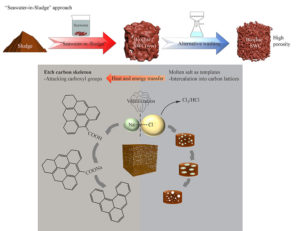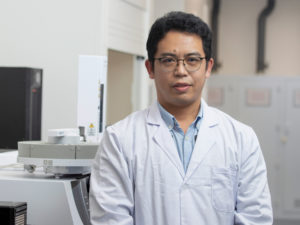Hao Tianwei, assistant professor of civil and environmental engineering in the Faculty of Science and Technology (FST), University of Macau (UM), and his research team have received the 2021 Best Paper Award from the top environmental engineering journal Frontiers of Environmental Science & Engineering (FESE) for their research study in sludge biochar, which provides important implications for sludge recycling.
The application of sludge biochar is a trending topic in recent years. Biochar not only is used as soil amendment, catalyst, or adsorbent, but also can be applied in the preparation of electrochemical capacitors when modified because of its large surface area. Titled ‘Atled per -in-Sludge” Approach for Capacitive Biochar Production via the Alkaline and Alkaline Earth Metals Activation’, the UM team’s paper proposes modifying sewage sludge pyrolysis by using a large amount of alkali metals and alkaline earth metals found in seawater as activators.
The results of the study show that seawater is an effective activator and the surface area and capacitance of the biochar can be enhanced through this process. When pyrolysis is performed at 750 °C, the seawater-activated biochar could reach the maximum surface area (480.3 m2/g). The high degree of graphitisation and low number of functional groups in activated biochar resulted in a lower resistivity in comparison with the biochar without sweater addition. The research results provide important implications for sludge recycling.
Frontiers of Environmental Science & Engineering is an international journal jointly published by Tsinghua University, the Chinese Academy of Engineering, and Higher Education Press. It covers all major branches of environmental science and engineering. The journal published a total of 133 papers in 2021 and the UM paper was selected by the editorial board of the journal. The paper can be viewed here: https://journal.hep.com.cn/fese/EN/10.1007/s11783-020-1295-0
澳門大學科技學院土木及環境工程系助理教授郝天偉及其研究團隊的製備電容生物碳研究為污泥資源化提供了重要的借鑒,獲國際知名期刊《環境科學與工程前沿》(Frontiers of Environmental Science & Engineering, FESE)頒發2021年最佳論文獎。
污泥資源化是近年一個較為關注的議題,製備生物碳這一碳匯過程也有助於全球碳封存。將污泥轉化為生物炭不僅可用作土壤改良劑、催化劑或吸附劑,而且由於其具有較大表面積,改性後的生物炭也可用於電容器的製備。郝天偉團隊的獲獎論文題為《海水活化污泥製備電容性生物炭研究》(A “Seawater-in-Sludge” approach for capacitive biochar production via the alkaline and alkaline earth metals activation),團隊研究利用海水中含有的大量鹼金屬和鹼土金屬為污泥活化劑製備污泥改性生物炭。
結果表明,海水是一個高效的活化劑,製備所得的生物炭表面積和電容量均有所提高。熱解溫度為750℃時,海水活化的生物炭可達到最大表面積(480.3 m2/g)。活化生物炭中石墨化程度高,官能團較少,致使其電阻遠低於未活化生物炭。研究結果為污泥資源化提供了重要的借鑒。
《環境科學與工程前沿》由清華大學聯合中國工程院、高等教育出版社共同出版,涵蓋環境科學與工程的所有主要分支。該期刊於2021年共刊登133篇研究和綜述論文,澳大的研究被編委會選出。
論文原文可瀏覽:https://journal.hep.com.cn/fese/EN/10.1007/s11783-020-1295-0

Frontiers of Environmental Science & Engineering 《環境科學與工程前沿》
Hao Tianwei
郝天偉


